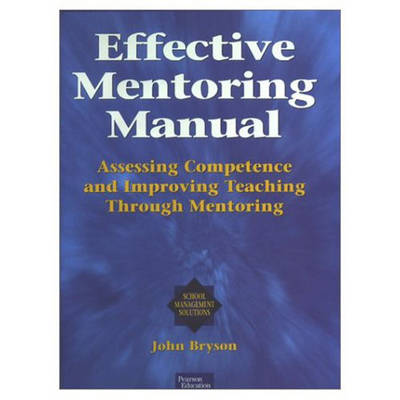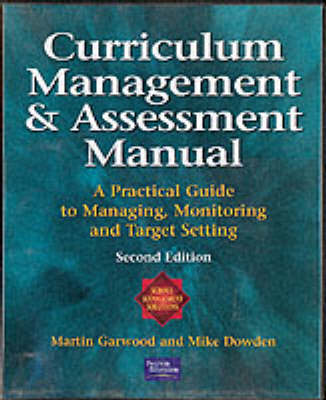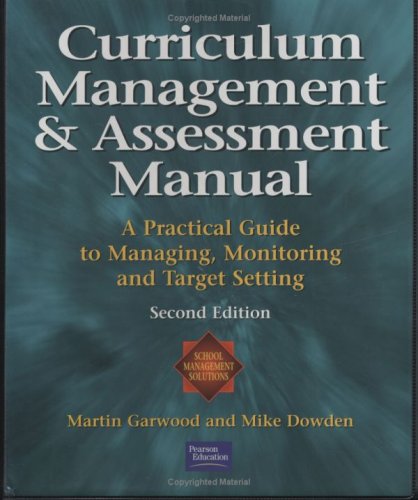Schools Management Solutions
4 total works
The emergence of the teacher as a mentor within initial teacher education has been a relatively recent concept. Yet mentoring has become a fundamental feature of teacher development. The expansion of mentoring means that there has been a need to explore the challenges that have been created for teachers, their schools and the continuing professional development programmes that will provide the necessary knowledge, skills and training opportunities for teachers to become effective mentors. Part of the School Management Solutions Series, this user-friendly manual enables all prospective mentors to construct their own route to experienced and trusted counsellor status.
It will help you to: * identify mentoring roles from personal experience and analyse models to decide which model, or combination of models, is likely to function best in your institutional context * explore a range of mentoring strategies and the means of sharing good practice with proteges, including apprenticeship, competence and reflective models of mentoring * identify the contribution that school-based teacher training can make to the professional and intellectual environment of teachers' working lives * understand the provision of induction to allow teachers to work successfully * organise the tasks of mentors, including a summary of the mentor role and the roles of other people who support their protege * apply a distinctively competence-based approach to initial and continuing teacher education.
It will help you to: * identify mentoring roles from personal experience and analyse models to decide which model, or combination of models, is likely to function best in your institutional context * explore a range of mentoring strategies and the means of sharing good practice with proteges, including apprenticeship, competence and reflective models of mentoring * identify the contribution that school-based teacher training can make to the professional and intellectual environment of teachers' working lives * understand the provision of induction to allow teachers to work successfully * organise the tasks of mentors, including a summary of the mentor role and the roles of other people who support their protege * apply a distinctively competence-based approach to initial and continuing teacher education.
Curriculum Management & Assessment Manual/ Effective Mentoring Manual Pack
by John Bryson, Martin Garwood, and Mike Dowden
Published 15 March 2002
Curriculum Management & Assessment Manual 2e Pack
by Martin Garwood and Mike Dowden
Published 10 December 2001
This easy-to-use manual provides practical advice on the key tasks facing curriculum leaders, allowing you to develop, refine and improve the work you do. Drawing on national reports and findings these key tasks are put into the context of the broad picture of the challenges facing schools today and set alongside ideas of best practice. 5 unique sections which support the areas of monitoring, evaluation and target setting Divided into five unique sections which allow you to dip in and select areas that reflect your needs and those of your school at particular times, this user-friendly manual helps you to decide on your next steps as a curriculum leader. It provides support in the areas of monitoring, evaluation and target setting. Using practical examples, it enables you to: *understand your leadership role *identify your key tasks as a curriculum leader *review the quality and organisation of the curriculum *implement key changes arising from Curriculum 2000 *review and develop assessment *develop strategies for monitoring and evaluation *set targets for improvement *build upon your skills as a curriculum leader *identify ways to develop your role further.
Curriculum Management & Assessment Manual 2e
by Martin Garwood and Mike Dowden
Published 28 September 1998
Schools are entering a new era in the development of the curriculum. The introduction of government-led initiatives and findings from OFSTED inspections have all highlighted the importance of an effective curriculum which is efficiently delivered. How can you ensure your school meets these important requirements? From the School Management Solutions Series, the Curriculum Management and Assessment Manual provides up-to-date supportive guidance for all those involved in managing the curriculum. Designed to be used as a working document, this practical manual allows you to select the areas that reflect your needs and those of your school, helping you to: *review the quality and organisation of the curriculum *make time for literacy and numeracy *develop strategies for monitoring and evaluation *build upon your skills as curriculum manager *review and develop assessment *set targets for improvement *identify further ways to develop your role. Comprising of five main sections which can be used independently, each section contains an action plan plus valuable photocopiable resources such as templates, checklists, case studies, questionnaires, and individual and group activities.Written by experts in curriculum management and assessment, the Curriculum Management and Assessment Manual is essential reading for all head teachers, heads of departments, subject leaders, governors and NPQH students.
Contents include: INTRODUCTION About the manual Using the manual SECTION 1 MANAGING THE CURRICULUM The well-organised curriculum More policies and schemes of work Evaluating the scheme of work Making time for literacy in Key Stages 1& 2 The place of literacy and numeracy The curriculum and spiritual, moral, social and cultural development Putting it all together - Developing a role in the curriculum Workshop tutorials SECTION 2 MANAGING ASSESSMENT Assessment defined Meeting the statutory basis of assessment Managing quality assessment Using assessment information Making it happen, the role of the curriculum manager Workshop materials SECTION 3 MANAGING THE MONITORING OF THE CURRICULUM Responsibilities for monitoring Monitoring the teaching of the curriculum Other strategies for monitoring the curriculum Making it happen - Organising monitoring and evaluation Two case studies in monitoring and evaluation A policy for monitoring and evaluation Completing the picture Workshop materials SECTION 4 SETTING TARGETS FOR IMPROVEMENT Using assessment data to renew performance Analysing your performance against national averages Comparing your performance with schools with similar characteristics Value-added analysis Into targets Planning with targets in mind Subject development plans Workshop materials SECTION 5 CURRICULUM MANAGEMENT SKILLS Managing meetings Making presentations Giving and receiving feedback Dealing with conflict Time management Workshop materials PLUS REFERENCES AND FURTHER READING
Contents include: INTRODUCTION About the manual Using the manual SECTION 1 MANAGING THE CURRICULUM The well-organised curriculum More policies and schemes of work Evaluating the scheme of work Making time for literacy in Key Stages 1& 2 The place of literacy and numeracy The curriculum and spiritual, moral, social and cultural development Putting it all together - Developing a role in the curriculum Workshop tutorials SECTION 2 MANAGING ASSESSMENT Assessment defined Meeting the statutory basis of assessment Managing quality assessment Using assessment information Making it happen, the role of the curriculum manager Workshop materials SECTION 3 MANAGING THE MONITORING OF THE CURRICULUM Responsibilities for monitoring Monitoring the teaching of the curriculum Other strategies for monitoring the curriculum Making it happen - Organising monitoring and evaluation Two case studies in monitoring and evaluation A policy for monitoring and evaluation Completing the picture Workshop materials SECTION 4 SETTING TARGETS FOR IMPROVEMENT Using assessment data to renew performance Analysing your performance against national averages Comparing your performance with schools with similar characteristics Value-added analysis Into targets Planning with targets in mind Subject development plans Workshop materials SECTION 5 CURRICULUM MANAGEMENT SKILLS Managing meetings Making presentations Giving and receiving feedback Dealing with conflict Time management Workshop materials PLUS REFERENCES AND FURTHER READING



